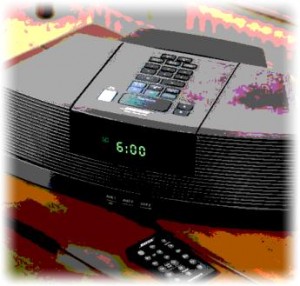 I love radio. I grew up listening to light static interspersed with music, comedy, news, and drama.
I love radio. I grew up listening to light static interspersed with music, comedy, news, and drama.
Is there a radio gene? I suspect that there might be. My father was a big fan of radio (‘wireless’, as he called it). And my only other sibling spent most of her working life presenting, producing, and directing radio in four different countries.
Among my earliest memories are programmes like Take It From Here, The Navy Lark, Brothers In Law, Hancock’s Half Hour, and, of course, The Goon Show.
But I also enjoyed American shows like Nightbeat. ‘Hi there. This is Randy Stone. I cover the night beat for the daily. Stories start in many different ways ….’
And I was an enormous fan of Alistair Cooke’s Letter from America. I loved the way in which his ‘letters’ took you on a journey and then, perhaps when you least expected it, they returned you to the point from which you had set out.
Quiet early in my writing career I heard radio described as ‘theatre for the mind’. And that seemed about right to me. That’s what it is. You hear sounds; and your mind ‘sees’ pictures.
After I had been writing for radio for a year or five, I attended a workshop led by a couple of radio ‘gurus’. Over the course of the day, they stressed three things.
Tell a story. Whether you are reporting news, presenting drama, or pitching a commercial message, what people are listening for is a story. They are listening for something that tells them something. They are listening for something that ‘makes sense’. If there is no story, they will probably tune out.
Use language that people can easily understand. If the listener has to stop and mentally – or literally – look up a word or phrase, they will miss part of your message. And maybe they will abandon it altogether. Use plain language. Wherever possible, eschew jargon and other esoteric language.
Don’t over-write. Let your listeners use their imagination and ‘fill in the gaps’ in their own way. Leave space for them to think, to digest, to ‘file’ what you have told them.
Over the past few years, most of us have learned to deal with potential information overload. We have learned to pick a path, however imperfect, through the multiple messages we are presented with each day, each hour, each minute, even each nanosecond. And yet the old radio ‘rules’ still have a lot to recommend them. Just a thought.
